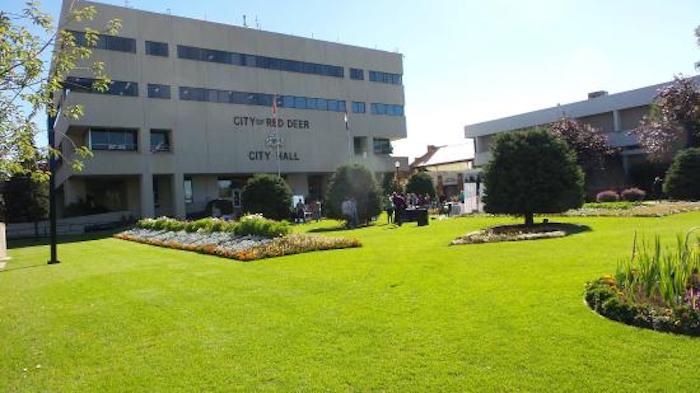City of Red Deer
City Council Meeting Recap

The following decisions were made at Monday’s regular City Council Meeting.
An updated Vehicle for Hire Bylaw will be coming to back to City Council for First Reading later this year, following discussion and approval of the following recommendations:
- Replace the age-based restrictions with a vehicle mileage restriction of 350,000 kilometers
- Explore additional options related to plate limits
- Remove drop rates for taxis
- No change to current drop rates for Transportation Network Companies (rideshare)
- Explore additional options for regulations for Transportation Network Companies
- Simplification of the licensing process
Administration will take Council’s feedback to consider updates to the bylaw to come back in Fall 2023.
RESPONSIBLE PET OWNERSHIP BYLAW FUNDAMENTALS AND DISCUSSION:
Council discussed fundamental components related to pet ownership and endorsed four key principles that will inform a future Responsible Pet Ownership Bylaw. The four principles that will influence the foundation of the bylaw include:
- Potential to license cats with a maximum of six cats per household.
- Maintain the limit of three dogs per household and include exceptions for new residents.
- Maintain maximum of four urban chickens per licence/household and remove cap on the number of licences available.
- Prohibit honeybee hives, excluding provincially licensed hives, and continued ongoing support for pollinator parks and natural area preservation initiatives.
First reading of a Responsible Pet Ownership Bylaw will come back to Council for consideration in Fall 2023. Council approved one-time funding of $45,000 to maintain the current service levels, including enforcement costs.
This new bylaw would combine four bylaws that currently regulate animals in our city into one bylaw, including the Dog Bylaw, Cat Bylaw, Urban Chicken Bylaw and aspects of the Community Standards Bylaw as it relates to livestock.
2023 TAX RATE BYLAW
Council approved the annual property tax rate bylaw, including tax rates for requisitions The City collects on behalf of Alberta Education and Bridges Community Living. The City’s budget was set by City Council in December with a 4.61 per cent tax increase. When combined with requisitions The City must collect on behalf of other organizations, the actual tax increase is 2.46 per cent for residential and non-residential properties. Multi-family properties will see a tax increase of 6.64 per cent. Tax notices will be mailed May 23, 2023. Read more.
BUSINESS IMPROVEMENT AREA TAX BYLAW
Council passed the Business Improvement Area (BIA) tax and tax rate bylaw, which funds the Downtown Business Association (DBA). Read more.
WESTERNER EXHIBITION ASSOCIATION LOAN BYLAW
Council approved second and third reading of the WEA Loan Bylaw to support shorter-term funding requirements while WEA regains financial sustainability. The loan is intended to support short-term cash flow for the Westerner by providing a $1 million line of credit for WEA to cover expenses prior to realizing event revenue. This contingency loan is seen as emergency funds, with an expectation for it to be paid back once revenue is realized and only used after their current line of credit.
PUBLIC HEARING – LAND USE BYLAW AMENDMENT
Following a public hearing, Council approved second and third reading to rezone 3718 46 Street in Eastview from R1A (semi detached dwelling/duplex) to R2 (medium density). The applicant intends to construct a new residential development on the property that is non-intrusive in design and contains slightly more units than the adjacent properties. This will gently increase density in the area. The maximum size of development for this property is four units (fourplex) based on site limitations and R2 District regulations, including landscaping, parking, and setback requirements.
—
To view the full Council agenda, video recording of the meeting and reports, visit: https://reddeer.ca/city-government/mayor-and-city-councillors/council-meetings-and-schedule/
City of Red Deer
City of Red Deer Employee Honoured with Bob Stollings Memorial Award for Outstanding Contributions

Annette Scheper, Community & Program Facilitator in the Safe & Healthy Communities Department is The City’s 2025 recipient of the Bob Stollings Memorial Award.
The Bob Stollings Memorial Award is given out each year to a City employee who displays outstanding performance in alignment with The City’s RISE cornerstone values – respect, integrity, service and excellence. Nominations for the award are submitted by fellow coworkers detailing the employee’s achievements professionally and interpersonally, along with letters of support. The award is considered a great honour among City staff.
With an impressive 22-year career, Annette has played a pivotal role in shaping Red Deer’s cultural and special events landscape. Her leadership and innovation have brought thousands of successful events to life, creating lasting traditions that enrich the lives of residents. Her commitment to excellence and resourcefulness has ensured that community initiatives are inclusive, accessible, and impactful.
One of Annette’s most notable achievements is the development of the Community Loan Program, which provides essential resources for local groups, contributing an annual value of $86,778.95 back into the community. In addition, she has successfully led and executed a variety of large-scale events, demonstrating remarkable problem-solving skills and a dedication to sustainability. From creating elaborate event designs with repurposed materials to managing complex logistics, she continuously sets the standard for excellence.
“Annette exemplifies the best of our organization,” said City Manager, Tara Lodewyk. “Her unwavering dedication, innovative thinking, and ability to bring people together has made a profound impact on our city. This award is a testament to her hard work and passion for creating meaningful experiences for our community.”
The Bob Stollings Memorial Award was first established in 1985 and is presented every year to honour Robert (Bob) E. Stollings, a loyal and dedicated City employee from 1960-1984.
City of Red Deer
Red Deer will choose a new Mayor as Ken Johnston decides to step away

It’s a telling detail about the person who leads Red Deer City Council. Always putting the city’s needs ahead of his own, Mayor Ken Johnston has announced his intentions within days of the opening of Nominations for October’s municipal elections,
After 12 years on council, Mayor Ken Johnston has decided against running for a second term as Mayor this fall. Johnson shared his decision in front of colleagues and supporters in a touching announcement on Wednesday.
At 71 years old, Johnston remains vibrant, passionate and healthy. He says that’s exactly why he and his wife Carolyn have decided now is the right time to start their next stage of life together.
Mayor Johnston listed a number of highlights and achievements he can look back on, including his help advocating for the redevelopment of Red Deer Regional Hospital, the growth of Red Deer Polytechnic, and positive moves in Economic Development.
All these lead of a feeling of ease about the decision to step away, though affordable housing and a permanent shelter for the homeless remain pressing concerns.
With about 8 months remaining in his term, Mayor Johnston is planning to push hard to move the needle on these housing issues.
“We’re looking forward to some more work and we’ll be going to the community shortly about it. So I still have optimism that maybe before the term is out we can have an announcement.”
This is the second major political announcement in Central Alberta in the last number of days. Earlier this week Red Deer Mountain View MP Earl Dreeshen announced he won’t be running in the next federal election.
-

 Business2 days ago
Business2 days agoTrump considers $5K bonus for moms to increase birthrate
-

 COVID-192 days ago
COVID-192 days agoRFK Jr. Launches Long-Awaited Offensive Against COVID-19 mRNA Shots
-

 Business2 days ago
Business2 days agoChinese firm unveils palm-based biometric ID payments, sparking fresh privacy concerns
-

 2025 Federal Election1 day ago
2025 Federal Election1 day agoConservatives promise to ban firing of Canadian federal workers based on COVID jab status
-

 Business1 day ago
Business1 day agoIs Government Inflation Reporting Accurate?
-

 2025 Federal Election1 day ago
2025 Federal Election1 day agoCarney’s Hidden Climate Finance Agenda
-

 Environment1 day ago
Environment1 day agoExperiments to dim sunlight will soon be approved by UK government: report
-

 Censorship Industrial Complex1 day ago
Censorship Industrial Complex1 day agoIs free speech over in the UK? Government censorship reaches frightening new levels





